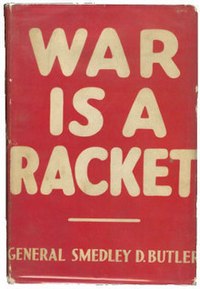Major General Smedley Butler: War is a Racket

War Is A Racket
By Major General Smedley ButlerPublished in 1935
CHAPTER ONE (EXCERPT)
War Is A Racket
WAR is a racket. It always has been.
It is possibly the oldest, easily the most profitable, surely the most vicious. It is the only one international in scope. It is the only one in which the profits are reckoned in dollars and the losses in lives.

A racket is best described, I believe, as something that is not what it seems to the majority of the people. Only a small "inside" group knows what it is about. It is conducted for the benefit of the very few, at the expense of the very many. Out of war a few people make huge fortunes.
In the World War [I] a mere handful garnered the profits of the conflict. At least 21,000 new millionaires and billionaires were made in the United States during the World War. That many admitted their huge blood gains in their income tax returns. How many other war millionaires falsified their tax returns no one knows.
How many of these war millionaires shouldered a rifle? How many of them dug a trench? How many of them knew what it meant to go hungry in a rat-infested dug-out? How many of them spent sleepless, frightened nights, ducking shells and shrapnel and machine gun bullets? How many of them parried a bayonet thrust of an enemy? How many of them were wounded or killed in battle?
Out of war nations acquire additional territory, if they are victorious. They just take it. This newly acquired territory promptly is exploited by the few -- the selfsame few who wrung dollars out of blood in the war. The general public shoulders the bill.
And what is this bill?
This bill renders a horrible accounting. Newly placed gravestones. Mangled bodies. Shattered minds. Broken hearts and homes. Economic instability. Depression and all its attendant miseries. Back-breaking taxation for generations and generations.
For a great many years, as a soldier, I had a suspicion that war was a racket; not until I retired to civil life did I fully realize it. Now that I see the international war clouds gathering, as they are today, I must face it and speak out.
Again they are choosing sides. France and Russia met and agreed to stand side by side. Italy and Austria hurried to make a similar agreement. Poland and Germany cast sheep's eyes at each other, forgetting for the nonce [one unique occasion], their dispute over the Polish Corridor.
The assassination of King Alexander of Jugoslavia [Yugoslavia] complicated matters. Jugoslavia and Hungary, long bitter enemies, were almost at each other's throats. Italy was ready to jump in. But France was waiting. So was Czechoslovakia. All of them are looking ahead to war. Not the people -- not those who fight and pay and die -- only those who foment wars and remain safely at home to profit.
There are 40,000,000 men under arms in the world today, and our statesmen and diplomats have the temerity to say that war is not in the making.
Hell's bells! Are these 40,000,000 men being trained to be dancers?
| Contents |
| Chapter 1: War Is A Racket |
| Chapter 2: Who Makes The Profits? |
| Chapter 3: Who Pays The Bills? |
| Chapter 4: How To Smash This Racket! |
| Chapter 5: To Hell With War! |
- Born: West Chester, Pa., July 30, 1881
- Educated: Haverford School
- Married: Ethel C. Peters, of Philadelphia, June 30, 1905
- Awarded two congressional medals of honor:
- capture of Vera Cruz, Mexico, 1914
- capture of Ft. Riviere, Haiti, 1917
- Distinguished service medal, 1919
- Major General - United States Marine Corps
- Retired Oct. 1, 1931
- On leave of absence to act as
director of Dept. of Safety, Philadelphia, 1932 - Lecturer -- 1930's
- Republican Candidate for Senate, 1932
- Died at Naval Hospital, Philadelphia, June 21, 1940
- For more information about Major General Butler,
contact the United States Marine Corps.
- $8.5 Trillion in Taxpayer Money Doled Out to the Pentagon Since 1996 Has Never Been Accounted For
- CBS News - Donald Rumsfeld Announces $2.3 Trillion Has Gone Missing from Pentagon on September 10th, 2001
- $40 Spending Bill to Fund DHS Through September 30, 2015 Approved by Congress
- Defense Contractors Using Cheap Prison Labor Rather Than Highly Paid, Unionized Workers
- The Return of Debtors Prisons (After All, Prison Labor is Cheap Labor for Transnational Corporations and Private Prisons Get Paid More If There are More Inmates)
- Human Trafficking in America's Private Prisons
- Cheney, Gonzales Indicted on Prison Abuse Charges
- Halliburton, Cheney and the Military Industrial Complex
- Taxpayers Get Stuck Saving Defense Contractors' Pensions
- Pensions at top 18 contractors cost government $3.3 Billion in 2010
- Pentagon Contractor CEO Compensation is Second to None
- DOE Estimates That Future Contractor Pension Liabilities Could Be $36.7 Billion Over the Next 10 Years



No comments:
Post a Comment